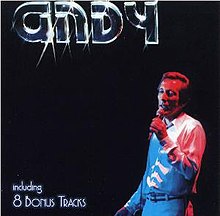
Broken Blossom is the fourth studio album by American singer Bette Midler, her second album release in 1977 and her fifth on the Atlantic Records label. Just as Midler's three previous studio albums Broken Blossom includes songs from a wide variety of genres, ranging from Edith Piaf's signature tune "La vie en rose", Phil Spector-esque covers of Billy Joel's "Say Goodbye to Hollywood" and Harry Nilsson's "Paradise" and hard rock like Sammy Hagar's "Red", to a jazzy duet with Tom Waits, "I Never Talk to Strangers", and a rendition of "A Dream Is a Wish Your Heart Makes", originally from Walt Disney's 1950 film version of Cinderella. The album reached #51 on Billboard's album chart.

The Wonderful World of Andy Williams is the thirteenth studio album by American pop singer Andy Williams and was released by Columbia Records to coincide with the December 31, 1963, broadcast of The Andy Williams Show. Various tracks were recorded with members of his family, including The Williams Brothers, who joined him for a remake of his first top 10 hit, "Canadian Sunset", from 1956.

The Great Songs from "My Fair Lady" and Other Broadway Hits is the fifteenth studio album by American pop singer Andy Williams and was released in September 1964 by Columbia Records, one month before the premiere of the film version of My Fair Lady starring Audrey Hepburn.

The Shadow of Your Smile is the eighteenth studio album by American pop singer Andy Williams and was released in April 1966 by Columbia Records and included covers of "Michelle" and "Yesterday", the same pair of Beatles ballads that labelmate Johnny Mathis recorded for his 1966 album of the same name. For Williams these selections initiated a trend away from the traditional pop formula that his album output at Columbia up until this point had adhered to.
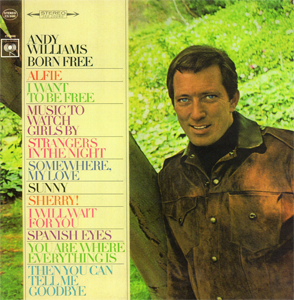
Born Free is the twentieth studio album by American pop singer Andy Williams and was released on April 10, 1967, by Columbia Records and includes half a dozen songs associated with movies or musicals. Two of these tracks, however, originated in the scores of the films indicated on the album jacket but had lyrics added later: the melody for "Strangers in the Night" was written for A Man Could Get Killed, and "Somewhere My Love" began as "Lara's Theme" from Doctor Zhivago.
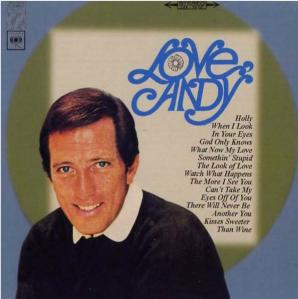
Love, Andy is the twenty-first studio album by American pop singer Andy Williams, released on October 16, 1967, by Columbia Records to coincide with the NBC special of the same name, which aired on November 6. The LP had a mix of covers of old and recent hits that included two songs from the 1940s that also had chart success in 1966 via Chris Montez: "The More I See You" and "There Will Never Be Another You".
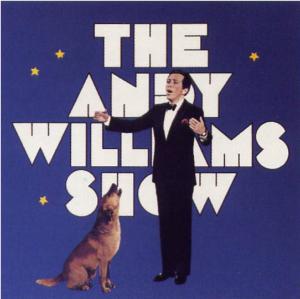
The Andy Williams Show is the twenty-sixth studio album by American pop singer Andy Williams that was released in the fall of 1970 by Columbia Records. In his review on AllMusic.com, William Ruhlmann writes that "The Andy Williams Show LP was not a soundtrack recording from the TV series, and it was not really a live album, although it gets categorized as such. What appears to be the case is that Columbia Records took a group of Williams' studio recordings, most of them made during the summer of 1970 and consisting of his versions of recent soft rock hits, and added a lot of canned applause along with some of the kind of musical interludes used to usher numbers on and off on the show, including bits of its "Moon River" theme music at the start and the finish."

You've Got a Friend is the twenty-eighth studio album by American pop singer Andy Williams, released in August 1971 by Columbia Records. The album bears a striking resemblance to the Johnny Mathis album You've Got a Friend released that same month. Besides sharing their name, the two albums are both made up of covers of easy listening hits of the time, with 11 songs each, and the two albums have seven songs in common that are positioned in a similar order.

Love Theme from "The Godfather" is the twenty-ninth studio album by American pop singer Andy Williams, released on March 21, 1972, by Columbia Records. The two new songs on what was otherwise another LP of covers of hits by other artists were the title track and "Music from Across the Way", which came from the songwriters behind his recent hits "Happy Heart" and "(Where Do I Begin) Love Story".
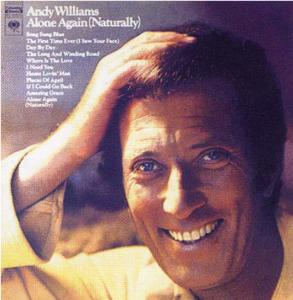
Alone Again (Naturally) is the thirtieth studio album by American pop singer Andy Williams, released in September 1972 by Columbia Records and mainly consisting of songs originated by other artists. For its release in the UK, the album was titled The First Time Ever (I Saw Your Face), and three of the songs were replaced with the 7-inch single tracks "Who Was It?" and "Marmalade, Molasses & Honey" and a recording that was not released on vinyl in the U.S., "If You're Gonna Break Another Heart".

The Way We Were is the thirty-second studio album by American pop singer Andy Williams, released in the spring of 1974 by Columbia Records and was a return to singing songs that his audience was already familiar with after Solitaire, his previous LP that was less reliant on covers of recent pop hits, did not perform well.

You Lay So Easy on My Mind is the thirty-fourth studio album by American pop singer Andy Williams, released in November 1974 by Columbia Records. The idea for this LP was mentioned in an interview with Williams in the November 3, 1973, issue of Billboard magazine that emphasized his desire to move away from recording albums of Easy Listening covers of hits by other artists, noting that he was "planning an album to be cut in Nashville with Columbia's high-flying country-pop producer, Billy Sherrill." The article coincided with the release of his first attempt to shift directions, Solitaire, which performed poorly. A return to the Easy Listening hits formula, The Way We Were, followed in the spring of 1974 but failed to even chart, so this next attempt to eschew soft rock songs leaned heavily on Country hits.

The Other Side of Me is the thirty-fifth studio album by American pop singer Andy Williams, released in the summer of 1975 by Columbia Records and including the 1973 recording of "Solitaire" from his album of the same name alongside 10 original recordings, four of which were also by "Solitaire" composer Neil Sedaka. After unsuccessful attempts to leave behind the formulaic album genre of easy listening covers of pop hits, The Other Side of Me offered a compromise by filling half of the sides with material that was popularized by other artists and the other half with either new or obscure selections.

Let's Love While We Can is the thirty-seventh studio album by American pop singer Andy Williams, released in the U.K. in 1980 by CBS Records. For this project Williams eschews covering well-known pop hits and standards and relies mostly on original or lesser-known country songs.

To You Sweetheart, Aloha is the fourth studio album by American pop singer Andy Williams and was released late in the summer of 1959 by Cadence Records. This, his fourth LP for the label, has a Hawaiian theme that coincides with the admission of the 50th of the United States.

I Still Believe in Santa Claus is a Christmas album by American pop singer Andy Williams that was released by Curb Records in 1990. It was his fourth solo album of Christmas music, following The Andy Williams Christmas Album (1963), Merry Christmas (1965) and Christmas Present (1974). As with the 1965 LP, this album focuses exclusively on 20th-century compositions, including two new songs: "Christmas Needs Love to Be Christmas" and "My Christmas Vow ", the latter of which Williams describes in the liner notes as "a new lyric set to an old Hawaiian melody".

Nashville is the forty-first studio album by American pop singer Andy Williams, released by Curb Records in 1991. It's Williams's second album of country music, the first being You Lay So Easy on My Mind in 1974, and was reissued with a different track order under the title Best of Country on September 7, 1999.
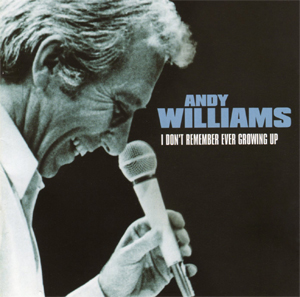
I Don't Remember Ever Growing Up is the forty-third and final studio album by American pop singer Andy Williams, released in the UK by the Demon Music Group in 2007. In the liner notes of the album Williams writes, "Over the past few years I have come across songs that I really wanted to record. I picked 13 of my favorites and set out to make a new record." While the title track is the only new song, the other 12 selections were chart hits for other artists or, as is the case with "Desperado" by the Eagles, received critical acclaim without having been released as a single.

We'll Sing in the Sunshine is the tenth studio album by Australian-American pop singer Helen Reddy that was released in 1978 by Capitol Records. The album included two songs that were also covered by Johnny Mathis in the first half of that year: "All I Ever Need", which came out on his March release, You Light Up My Life, and "Ready or Not", on which he duetted with Deniece Williams for their June release, That's What Friends Are For. Reddy also ventures into Beatles territory with their rockabilly number "One After 909" and takes on Jeff Lynne's "Poor Little Fool" with accompaniment in the vein of Electric Light Orchestra. This was her first album not to reach Billboard's Top LP's & Tapes chart. On February 23, 2010, it was released for the first time on compact disc as one of two albums on one CD, the other album being her 1977 release, Ear Candy. "Blue" was originally featured on the 1977 animated film Raggedy Ann & Andy: A Musical Adventure.

Play Me Out is the thirteenth studio album by Australian-American pop singer Helen Reddy that was released in 1981 by MCA Records. Having recorded 12 studio albums at Capitol Records over a 10-year period, she felt the move was "'long overdue... For the last three years I didn't feel I was getting the support from them.'" Whatever support she received from the new label was not enough to get the album onto Billboard magazine's Top LPs & Tape chart.
